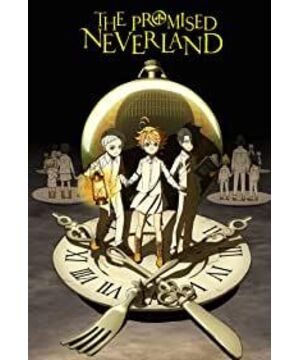First of all, as an animation, Yan Yi is well received, the soundtrack is well received, and the character design is well received.
Then I want to talk about the rules, friendship/love, and strong beliefs mentioned in the animation.
Serious spoiler warning. ⚠️
1. Rules
At the beginning of the story, Emma and Norman broke the rules and went to the door and discovered the secret of the farm, and a rebellion and escape began. Both "Animal Farm" and "The Truman World" reveal a truth: a group that operates within set rules and boundaries, ignorant of what is outside its boundaries and the fact that it is controlled. In the abstract, this leads me to question what "objective" refers to. - Am I seeing the real world? Or was it created by design? If I can't know the truth all the time, what is the difference between what I think and what exists objectively? This leads to a series of action questions - if from a higher dimension, everything has a specific ending, is there any meaning to hard work and struggle? Can the rules be broken? Are there rules beyond the rules? Specifically, are there higher-dimensional species above the universe? Are human societies manipulated and captive? How far has the captive relationship between the ruling class and the ruled class developed within human society? People are mortal, so what are they trying to live for? Do I need to work hard for a breakthrough? If the breakthrough in circles is to seek more happiness, then what is happiness itself? Is it the sensual pleasures brought about by "seeing"? If it can be achieved within the rules? ...fortunately the story gave me some answers.
After asking, the answer has gradually become clear. If it can be achieved within the rules, there is no need to break it. So many people come up and ask if the rules need to be broken, which is pointless. Contradictions are formed by the gap between goals and conditions. In the process of exploring whether the conditions are met, the boundaries of the rules can be clarified, and then the method of breaking them can be considered. So the first step is to figure out what the goal is; the second step is to find out the entire content of the existing rules and find the boundaries of the rules; the third step is to break the rules (whether they should be broken, how to break them). In addition to the rules, there are still rules. But rules and rules are different. Inside the "door", the longest one cannot live to be twelve years old; outside the "door", there is another possibility. The company system, national laws, international agreements, and disciplinary laws are just as true. Why Leonardo da Vinci was proficient in dozens of fields, and why Newton escaped into the gate of God, I understand it—starting from philosophical questions, the inevitable return of law exploration.
2. The relationship between rules and freedom
Because breaking the rules often occurs in the form of revolutions, and revolutions are often accompanied by the slogan of "freedom", I once thought that rules were the opposite of freedom, and at the same time, I was logically consistent from the point of view of "dual unity", that is, "rules" and freedom go hand in hand." But now I have a different opinion. Freedom is not always the opposite of the rules, it is more accurate to say that before the revolution, freedom was the opposite of the rules of the day. In other words, "freedom" is the "goal" of the rule. In theory, after clearing the edges of the rules, you should first find out whether other rules other than the current rules are better or worse, and then decide whether to break them. But from a practical point of view, there was not enough time to do enough research, or there was no way to confirm or falsify it under the conditions at the time. Because the current rules have forced people to give it a go by breaking the rules, otherwise it will only have a very bad and unacceptable ending, and only breaking the rules has a silver lining. And so the revolution broke out. However, when there are surplus resources and innovation is possible, it is also possible to pursue other goals, explore the boundaries of the rules, and calmly implement the rules-related strategies.
3. Friendship/Love
What I've been looking for from start to finish is a relationship like the one Emma, Norman, and Ray have, and it doesn't have to be defined as friendship or love. To be honest, it's because I've never been able to tell the relationship between the two. When I was a child, I was gossipy, and I didn't think there was pure friendship. Later, he became picky and didn't know what love was. If I had to define a more ideal relationship, then I would say, first, is my good friend; second, I am willing to have sex with him. The first point includes two points, one is being able to share, exchange and discuss some opinions; the other is being able to play and do some things together. Regarding the second point, it's just my feeling. Because I have some friends with whom I can talk freely and have a good time, and some friends with whom I can have more fun. But there are very few who can enjoy the intimacy of skin. I can't say it well. A guess, it may be rare to meet people I admire very much. And this is very important to my body. Therefore, if you can gather these three points into one person, it is really a very rare person.
Norman appreciates Emma's "big love" (or "kindness"), so he can give her the greatest support; it is because of this appreciation that Emma's firm idealism is reversed Give Norman firmness and warmth. Ray, because he did not have a baby with amnesia, actually had a huge trauma, but Emma and Norman's never-say-die care touched him a lot. Norman and Ray have the same calmness and wisdom, so they can easily reach consensus on many strategies and strategies; while Norman is calm but has more sensibility, enthusiasm and romanticism than Ray, this difference inspires Accidents and surprises have made each other a more colorful life experience. The three children are also very responsible and capable. They can play a leading role when the other party is frustrated and discouraged, and finally let the other party return to the middle of the team at the right time. The tacit understanding of these three people can be called "harmony but difference, beauty and beauty in common", which is really desirable.
A few other snippets are very touching:
3.1
"Can you disturb me? I want to hear Emma's opinion. If someone volunteers to be a ghost's subordinate and can save his life by being a spy, will Emma leave the child behind? Or take him with him? ' said Norman.
"Take it with you," Emma replied.
"Even if the other party doesn't want that?" Norman asked.
"Well! I'm going to pull him away! Because if we escape, the child's life may not be guaranteed. And, as expected, I still want to believe in everyone. We are a family that grew up together. Obstruction, even if I am betrayed, even if someone says I am naive, I still want to believe that child!"
Norman came to ask Emma's opinion, which showed his gentleness and gentleness, which is what I like about Norman.
Emma's kindness is what I like about Emma. I can't do that, but I like it. ——She thinks positively about the motivation of others. This kind of trust, although it is a kind of naivety, is also a kind of mind. In fact, for myself, I am not only naive, but also lack-minded, but I also know these two points, so I do not have the courage of Emma.
It is also because of trust. After the battle with Dong and Gilda, Emma realized the pain and distress caused by her distrust to the "incompetent". Emma decided to correct her mistakes and tell the truth of the farm to Tow and the rest of Gilda. "Dong and Gilda, maybe everyone is, and they're not as naive as we thought. Since they want to escape from those monsters, I think it's better to let them know the danger and join the prison break at their own will. No vigilance other than older kids," Emma told Norman. Respect and equality are worth reflecting on current education.
3.2
"If that's what your purpose was in the first place, you should use me without saying a word. Use me without a word, and then abandon me when you actually act. That's more reliable."
"That's true. 'We grew up together'... So I changed my mind too. I want to trust Ray too. I believe you were a friend before you were an enemy. Also, it was Ray who hid the little bunny. Right? We wouldn't have gone if Ray didn't say it was too late. Ray was leading us to discover the truth about the orphanage. It was for us that Ray planned this escape? Why did Ray be his mother's lackey? If you were 100% mom's lackey, you wouldn't want us to find out. Ray has been around us. Regarding the sender, and the timing of the jailbreak, it's mainly the progress of the plan, so it's strongly against ten days later. The escape from prison. Are you also controlling your mother? Lei really isn't the enemy, right?"
On the tone of "believing in Lei" and with strict logical reasoning, Norman did not choose to "use Lei indiscriminately, and then abandon it when he actually acts." Of course, if Lei is really the enemy, there is a possibility of recruiting security in exchange for such words, and it will not cause further losses to our own side.
3.3
"You're so reckless. Reckless and naive and naive. But straight. That's why I..." Norman said.
Norman love.
"It's okay, never give up."
Norman's comfort and encouragement.
4. Be firm
I don't know which book I read in which year, but now I always like to start my speech with "could it be" or "is it possible". The language in turn affects the way of thinking, and I notice that I have become less determined and decisive. , undecided. Therefore, when I saw in the story that Emma, Norman, and Ray were all able to strengthen their beliefs and opinions and strive for it, I couldn't help but think about the mechanism.
Emma insists on getting everyone off the farm from beginning to end, and Ray opposes it from beginning to end. Norman has always trusted his own abilities and judgment. "Fortunately, as long as I decide to do it, I can never do it." "No matter what you say, it's useless, and I won't change my mind.
With Emma's intelligence, it was impossible for her to not know the difficulties and obstacles she faced in taking everyone away, but it seemed as if she really didn't see it. I think Emma is emotionally driven, and her strong empathy and heartfelt kindness make it impossible for her to endure other decisions. At the same time, although she did not have a specific solution from the beginning, she had the confidence to overcome the difficulties. This confidence, of course, is related to my mother's careful care since she was a child - I haven't experienced too many feelings of being knocked down. Unlike Ray, Ray has baby memories, so from his experience, he thinks the prison is indestructible.
Is it really just what the plot needs for an eleven- or twelve-year-old child to be able to be "not confused"?
View more about The Promised Neverland reviews











